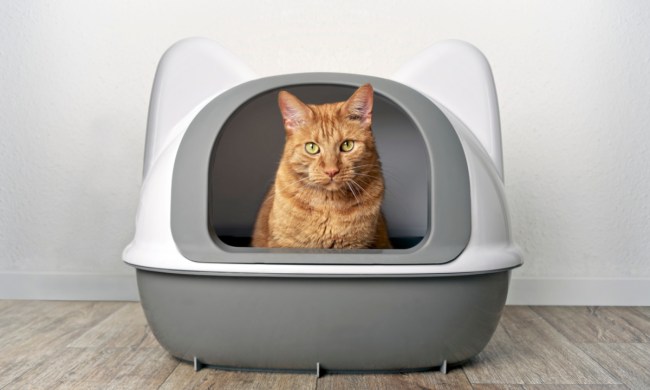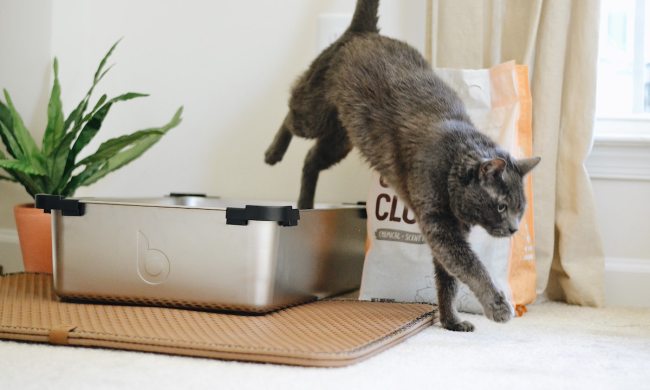Cleaning your cat’s litter box daily can help reduce its odors until you do your weekly deep clean, but then what do you do with the litter you remove each day? Putting it in your house trash can spread odors through your home, but carrying it out to your garbage cans every day is inconvenient.
Both the LitterLocker and the Litter Genie were designed to make daily litter box cleaning easier and more convenient. They store used litter right in your home so you don’t have to take it out to the trash every day. They also help contain odors so your home doesn’t smell. While these products feature similar designs, which is better for you and your cat? We break down the LitterLocker versus Litter Genie issue step by step to determine which product really is the best cat litter disposal system.
Dimensions
One major benefit of these litter systems is their small footprint: You can tuck them into tight corners of your bathroom or even fit them inside a cabinet.
- The LitterLocker measures 9.45 inches wide by 9.45 inches long by 16.93 inches high.
- The Litter Genie measures 8.5 inches wide by 9.5 inches long by 17 inches high.
The size advantage here goes to Litter Genie, which is nearly 1 inch narrower.
What you get
Both of these products include everything you need to get started.
- When you buy the Litter Genie, you’ll receive the base pail, a scoop, and one standard refill.
- In contrast, the LitterLocker comes with a bit more. You’ll receive the LitterLocker disposal system, one refill, one scoop, and one scoop holder.
These products rank equally in terms of what’s included. No matter which you buy, you’ll be ready to use the system right out of the box.
Ease of use
The LitterLocker and the Litter Genie work the same way. When you clean your cat’s litter box, you just open up each system’s lid and scoop the litter inside. Close the lid and lock it, and odors are contained. There’s no clear winner in this category because the products work so similarly.
Odor-locking properties
Cat litter odors can quickly become overwhelming, and you definitely don’t want to keep litter indoors when it’s stinking up your home. Both the LitterLocker and the Litter Genie were designed to put an end to the stinky-litter issue.
- The LitterLocker features air seal technology to help keep odors contained. Its refill bags are designed with multiple layers of material and feature an odor barrier so neither you nor your cat smells the litter.
- The Litter Genie features a seven-layer refill bag equipped with odor-barrier technology.
Both systems offer powerful odor-barrier technology to solve the stinky-litter problem. We rank them equal in this category.
Overall aesthetic
While your litter storage system might not be displayed prominently in your home, it’s still nice if it’s aesthetically pleasing.
- The LitterLocker comes in a standard white plastic, but you can customize it by purchasing the available decor sleeves. These sleeves come in different colors and patterns, giving you the chance to tailor the product’s appearance to your individual style and the colors in your bathroom, basement, or wherever else you plan to use the LitterLocker.
- The Litter Genie doesn’t have that option. It comes in a standard gray plastic finish, but the gray will go well with most colors in your home, so it should be an unobtrusive addition to your house.
When it comes to aesthetics, the LitterLocker takes this category. While the decor sleeves need to be purchased separately, they give you more control over the unit’s appearance than you’ll have with the Litter Genie.
Capacity
Because the LitterLocker and Litter Genie are similarly sized, they hold about the same amount of cat litter. Each system can hold up to 14 days of cat litter for a single cat, saving you lots of trips out to the trash and saving you time, too.
These products rank equal for capacity.
Cost
While the ability to easily store cat litter and spend less time taking it out to the trash is priceless, you need to consider the costs of these products, too.
- The LitterLocker costs $58.49, and refills cost $16.08 each.
- The Litter Genie is much more affordable: $14.99, and a pack of three refills costs $22.49.
The difference in price could be a result of LitterLocker’s manufacturer being based in Canada, potentially driving up the product’s cost in the American market. If you’re bargain hunting, then the Litter Genie is the way to go.
The final verdict
If you’re looking for a convenient way to store used cat litter, take fewer trips out to the trash, and lock in stinky odors, both the LitterLocker and Litter Genie offer great solutions. These products feature similar designs, capacities, and sizes, and they’re both easy to use. While the LitterLocker is available with more decor options, the Litter Genie is more affordable in both the price of the product and the cost of refills. Because of that significant value advantage, our pick for the best litter storage system goes to the Litter Genie, by a whisker.


